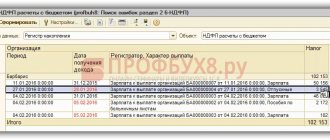Personal income tax is a special tax - it is transferred to the budget from the amount of income of an individual. This means that the employer must transfer to the budget exactly as much personal income tax as he withheld from the employee’s income. An organization acting as a tax agent does not have the right to pay tax at its own expense. What should you do if you calculated your tax incorrectly and withheld more? Or they made a mistake in the payment and instead of 1000 rubles, they transferred 10 thousand, can they be returned or offset?
A direct prohibition on paying personal income tax at the expense of an agent is specified in clause 9 of Art. 226 of the Tax Code of the Russian Federation: “Payment of tax at the expense of tax agents is not allowed, except for cases of additional assessment (collection) of tax based on the results of a tax audit in accordance with this Code in the event of unlawful non-withholding (incomplete withholding) of tax by a tax agent.”
In other words, personal income tax is not a tax that can be paid in advance for a year in advance. It is transferred to the budget every time income is paid to an individual. Why does overpayment still occur?
When may an overpayment of personal income tax occur?
An overpayment of personal income tax to the budget may occur when an organization that is a tax agent has excessively withheld and transferred to the budget personal income tax on amounts of income paid to an individual.
When an error in the calculation of personal income tax is identified and the taxpayer’s income is adjusted, the excessively withheld and transferred amount of personal income tax must be returned to the individual. And since the tax agent has already transferred this amount to the budget, then, accordingly, the organization must apply to the tax authority for a refund of overpaid personal income tax amounts.
Situations in which tax may be over-withheld are as follows:
- The employee received vacation in advance and quits. In this case, upon dismissal, the employer may withhold part of the overpaid vacation pay from the income due to the employee, but not more than 20% of the amount of these payments. The employee can return the rest voluntarily (this is where the over-withheld tax will appear). But if the employee refuses to return the vacation pay received in advance, then nothing can be done - the court in such cases takes the employee’s side, and there will be no excessive personal income tax withheld, because the employee kept the funds received for himself, which means he still received the income..
- If an error was made when calculating sick leave benefits and the employee was paid an inflated amount of benefits, then the Social Insurance Fund will not accept such amounts for credit. You will have to recalculate benefits and personal income tax. Again, the excess paid will either have to be withheld from income (but only in case of a counting error!) or the employee must be asked to voluntarily return the funds.
- When an employee is entitled to standard tax deductions, but he did not provide supporting documents in a timely manner . In such a situation, it is necessary to recalculate the tax base for personal income tax from the beginning of the year and an excessively withheld amount of tax may arise.
- If the employee receives a property deduction not from the beginning of the year. In this case, just as in the case of standard deductions, it will be necessary to recalculate the employee’s income from the beginning of the year and return the excess tax withheld.
- If the organization has a foreign employee working under a patent , then the previously withheld personal income tax will have to be returned if a notification of the right to reduce personal income tax on his income by the amount of fixed advance payments was received from the tax authority after the employer began paying such employee income .
- When personal income tax is incorrectly calculated at a higher rate or tax is withheld from non-taxable income.
How to return over-withheld tax to an employee
The procedure for returning personal income tax to an employee is specified in Art. 231 Tax Code of the Russian Federation.
After the accountant recalculates the tax and determines the over-withheld amount, he must inform the employee about it within 10 working days. There is no set form for reporting. Therefore, it can be drawn up in any form indicating the period of excess tax withholding, the amount of personal income tax to be refunded and a request to provide bank details for transferring the tax amount.
After receiving an application for a personal income tax refund from an employee indicating the details of the current account for transferring money, the employer has 3 months to return the personal income tax amount.
If the tax refund deadline is missed, it will need to be returned with interest, which is calculated for each calendar day of delay based on the refinancing rate of the Bank of Russia in effect on these days.
The tax must be returned only by bank transfer and only to the individual from whose income it was excessively withheld.
The tax is returned through current and future personal income tax payments for this and other employees. That is, instead of transferring personal income tax to the budget, you need to transfer the amount of over-withheld tax to a specific employee.
It may happen that the amount of personal income tax refund to an employee will be more than 3 months of the amount of calculated and withheld personal income tax for the entire organization. That is, in the next three months there may simply not be enough tax amount to be paid to the budget to refund the tax to the employee. In this case, you should contact the tax office for a refund. This must be done within 10 working days from the date of receipt of the application from the employee.
To do this, you need to prepare and send the following documents to the tax authority:
- application for refund of over-withheld tax;
- an extract from the tax register for the year in which excessive tax withholding occurred;
- documents confirming excessive withholding and transfer of tax amounts to the budget (in particular, copies of payment orders).
Within a month, the tax authority must transfer the money to the organization’s current account. And then it will be possible to transfer this money to the employee in the usual manner.
Also, the employer has the right to transfer money to the employee towards the return of personal income tax from his own funds, without waiting for the return of personal income tax from the budget. And then contact the tax office.
If an employee who has been found to have an excessively withheld amount of tax no longer works for the organization, he still needs to return the tax. The procedure is the same: you need to notify the former employee about the excess withholding, receive an application for a refund from him and transfer the amount of tax in the usual manner.
Who submits Form 6-NDFL and when?
Quarterly form 6-NDFL was approved by Order of the Federal Tax Service of Russia dated October 14, 2015 N ММВ-7-11/ [email protected] . For 9 months of 2021, entrepreneurs had to submit this calculation by October 30.
Tax authorities are waiting for information about calculated and withheld personal income tax amounts from tax agents - legal entities and individual entrepreneurs who, by law, are required to calculate, withhold from the taxpayer and transfer the tax to the budget system of the Russian Federation.
Legal documents
- Order of the Federal Tax Service of Russia dated October 14, 2015 N ММВ-7-11/ [email protected]
A technical error
Overpayment of personal income tax can also arise as a result of a technical error - when the accountant indicated in the payment order that more personal income tax should be paid than was withheld from the employees’ income. That is, everything in accounting was calculated correctly, but for some reason, when transferring it to the budget, an error was made in the amount.
In such a situation, according to the explanations of the regulatory authorities, the amount of the overpayment must be returned to the organization upon its application, as erroneously transferred.
The procedure for returning such amounts is also regulated by Art. 78 of the Tax Code of the Russian Federation, since nothing else is established in the Tax Code of the Russian Federation, and tax agents also have the right to timely offset or refund of amounts of overpaid tax, and the rules specified in Art. 78 of the Tax Code of the Russian Federation, also apply to tax agents.
To return an overpayment for personal income tax, you need to provide the tax office with:
- application for refund of overpayment;
- documents confirming the overpaid amount of tax: certificates in form 2-NDFL, register of information on the income of individuals, payment documents confirming the fact of the overpaid tax.
That is, the tax agent must provide documents from which it will be clear that this overpayment is not tax amounts withheld from the income of individual taxpayers, but is precisely the organization’s funds erroneously transferred to the budget. It is recommended that before writing the application, you sign a personal income tax reconciliation report with the tax office. Then the tax authorities will make sure that all charges on the personal account (which were reflected on the basis of the 6-NDFL calculation) have been paid and the existing overpayment has actually been paid from the company’s funds and is subject to refund.
The procedure for reflecting overpayments of wages in 6-NDFL
The employer has an obligation to submit an updated certificate 2-NDFL and an updated calculation 6-NDFL
01/11/2018 Author: Expert of the Legal Consulting Service GARANT Grafkin Oleg
In August 2021, as a result of an audit, an overpayment of accrued payments to the employee was revealed. They should have charged (conditionally) 2000 rubles. and withhold personal income tax in the amount of 260 rubles, and accrued 3,000 rubles. and withheld personal income tax in the amount of 390 rubles. The employee returned the overpayment in the amount of 870 rubles. in September 2021. That is, the organization does not apply in this case a mechanism for compensating for overpayments by reducing income in terms of subsequent payments. This employee retired in 2021. But from time to time an employee is hired by the organization temporarily (as a replacement).
How should this situation be reflected in form 6-NDFL and in form 2-NDFL in order to then reimburse personal income tax in the amount of 130 rubles?
On this issue we take the following position:
After the employer returns the amounts erroneously paid to the employee in 2021, the tax agent has the obligation to submit to the tax authority an updated certificate in Form 2-NDFL and an updated calculation in Form 6-NDFL for 2021.
Information related to adjusting the income received by the employee, returning the excess amount received and, accordingly, identifying the amount paid by the tax agent at his own expense, in the situation under consideration will not be reflected in the calculation indicators in Form 6-NDFL for the nine months of 2017.
To return overpaid amounts to an organization in the situation under consideration, it is necessary to submit a corresponding application to the tax authority at the place of registration in the manner prescribed by Art. 78 Tax Code of the Russian Federation.
Justification for the position:
The employing organization, which makes payments to the employee in accordance with the employment contract, by virtue of clause 1 of Art. 226 of the Tax Code of the Russian Federation, is recognized as a tax agent and is obliged to calculate, withhold from the employee and pay to the budget the amount of personal income tax (hereinafter also referred to as tax) calculated in accordance with Art. 224 of the Tax Code of the Russian Federation (taking into account the features provided for in Article 226 of the Tax Code of the Russian Federation).
Tax agents must withhold the accrued amount of personal income tax directly from the income of an individual upon actual payment (Clause 4 of Article 226 of the Tax Code of the Russian Federation).
According to paragraph 9 of Art. 226 of the Tax Code of the Russian Federation, payment of personal income tax at the expense of tax agents is not allowed.
In the letter of the Ministry of Finance of Russia dated October 30, 2015 N 03-04-07/62635, it was stated that in the case when an employee returns to the employer the amounts actually paid to him previously, such amounts will not be recognized as his income.
As we understand from the situation under consideration, until August 2021, the organization believed that the income in the disputed amount was paid to the employee correctly, and personal income tax was also withheld on the basis of current legislation. As a result of adjusting the amount of income intended for payment in 2021, the employee returned the overpaid amount of income (which does not contain a tax component).
Since the amount returned by the employee and the personal income tax related to it are not recognized as his income, this amount is overpaid by the tax agent or paid from his own funds (and not excessively withheld personal income tax).
Tax department specialists in such situations believe that the amounts transferred to the budget, which exceed the personal income tax actually withheld from the income of the payer, are not inherently a tax and recommend that in this case the tax agent contact the tax authority with an application for the return to the organization’s current account of the amount not which is personal income tax and erroneously transferred to the budget system of the Russian Federation (see, for example, letters from the Federal Tax Service of Russia dated 02/06/2017 N GD-4-8/ [email protected] , dated 10/19/2011 N ED-3-3/ [email protected] and from 07/04/2011 N ED-4-3/10764).
Since in the situation under consideration the occurrence of an overpayment of personal income tax is not due to excessive tax withholding (as well as a change in the status of taxpayers), we believe that the provisions of Art. 231 of the Tax Code of the Russian Federation, which establishes a special procedure for the return of personal income tax amounts, is not applicable in this case. That is, personal income tax paid from one’s own funds cannot be offset against upcoming payments according to the rules of Art. 231 Tax Code of the Russian Federation.
Consequently, the return of amounts overpaid by the organization in this case will be carried out in the manner established by Art. 78 of the Tax Code of the Russian Federation (see, for example, resolutions of the Tenth Arbitration Court of Appeal dated September 4, 2013 N 10AP-7697/13), the rules of which also apply to tax agents (clause 14 of Article 78 of the Tax Code of the Russian Federation, additionally see clause 34 of the resolution Plenum of the Supreme Arbitration Court of the Russian Federation dated July 30, 2013 N 57).
Submission of a calculation of the amounts of personal income tax calculated and withheld by the tax agent in Form 6-NDFL and updated information on the income of individuals in Form 2-NDFL (updated Certificate 2-NDFL)
In accordance with paragraph 2 of Art. 230 of the Tax Code of the Russian Federation, tax agents submit to the tax authority at the place of their registration:
- a document containing information on the income of individuals of the expired tax period and the amounts of personal income tax calculated, withheld and transferred to the budget system of the Russian Federation for this tax period for each individual, annually no later than April 1 of the year following the expired tax period, in Form 2 -NDFL, approved by order of the Federal Tax Service of Russia dated October 30, 2015 N ММВ-7-11/ [email protected] (hereinafter referred to as Certificate 2-NDFL);
- calculation of personal income tax amounts calculated and withheld by the tax agent for the first quarter, six months, nine months - no later than the last day of the month following the corresponding period, for the year - no later than April 1 of the year following the expired tax period, according to form 6- Personal income tax, approved by order of the Federal Tax Service of Russia dated October 14, 2015 N ММВ-7-11/ [email protected] (hereinafter referred to as Calculation 6-NDFL).
The 6-NDFL calculation is a document containing information summarized by a tax agent in general for all individuals who received income from this tax agent (a separate division of the tax agent) (paragraph six of clause 1 of Article 80 of the Tax Code of the Russian Federation):
— about the amounts of accrued and paid income;
— about the amounts of tax deductions provided;
— about calculated and withheld personal income tax amounts;
— about other data serving as the basis for calculating tax.
The obligation to submit an updated Calculation 6-NDFL to the tax authority arises when the tax agent discovers in the calculation submitted to the tax authority the fact of non-reflection or incomplete reflection of information, as well as errors leading to an underestimation or overestimation of the amount of tax to be transferred (clause 6 of Art. 81 Tax Code of the Russian Federation, letters of the Federal Tax Service of Russia dated 01/25/2017 N BS-4-11/ [email protected] , dated 12/15/2016 N BS-4-11/ [email protected] , dated 11/23/2016 N BS-4-11/ [email protected] ).
In relation to the Calculation of 6-NDFL for 9 months of 2021, there is no such obligation, since in this case, as already noted, there is not the fact of identifying an overstatement of the calculated amount of tax to be transferred, but the fact of identifying payment from one’s own funds of amounts exceeding the one subject to withholding from the personal income tax payer's income, which is not taxable.
Taking into account the above, information related to adjusting the income received by the employee, returning the excess amount received and, accordingly, identifying the amount paid by the tax agent at his own expense, in the situation under consideration will not be reflected in the indicators of Calculation 6-NDFL for the nine months of 2017 .
Due to the fact that the amount returned by the employee is not recognized as his income, the organization should be submitted to the tax authority taking into account clause 2 of Art. 230 of the Tax Code of the Russian Federation, an updated Certificate 2-NDFL in relation to an employee whose income has been adjusted in connection with the circumstances stated in the question.
If the employee returns to the employer the amounts actually paid to him in 2021, according to which the data on the income received is adjusted, the points in Section 5 of the updated certificate should be corrected in the updated certificate for 2021 in accordance with the indicators formed after the recalculation of income.
And since inter-document control relationships have been established between Certificates 2-NDFL with attribute 1, submitted for all taxpayers by this tax agent, and Calculation 6-NDFL for the year (letter of the Federal Tax Service of Russia dated March 10, 2016 N BS-4-11 / [email protected] " On the direction of Control Ratios"), then the tax agent, together with the updated Certificate 2-NDFL for 2021 in relation to the employee whose income has been adjusted, must simultaneously submit to the tax authority the updated Calculation 6-NDFL for 2021. At the same time, in accordance with paragraph 3 of Art. 88 of the Tax Code of the Russian Federation, the tax agent sends a written notification of identified errors.
To return overpaid amounts to an organization in the situation under consideration, it is necessary to submit a corresponding application to the tax authority at the place of registration in the manner prescribed by Art. 78 Tax Code of the Russian Federation.
Before submitting an application for a personal income tax refund, it is advisable for an organization to carry out a joint reconciliation of calculations with the tax authority (clause 5.1, clause 1, article 21, clause 2, article 24 of the Tax Code of the Russian Federation). According to paragraphs. 10 and 11 paragraph 1 art. 32 of the Tax Code of the Russian Federation, tax authorities are obliged to carry out, at the request of a taxpayer, fee payer or tax agent, a joint reconciliation of calculations for taxes, fees, penalties and fines and to provide the taxpayer, fee payer or tax agent, at his request, with certificates about the status of the specified person’s calculations for taxes, fees, penalties and fines based on data from the tax authority (see also letter of the Federal Tax Service of Russia dated July 4, 2011 N ED-4-3/10764).
Given the lack of clarification from official bodies on the situation under consideration, the expressed point of view should be treated as an expert opinion.
To prevent disagreements with regulatory authorities, the organization on the basis of paragraphs. 1 clause 1 art. 21, paragraph 2, art. 24 of the Tax Code of the Russian Federation may exercise the right of a tax agent to contact the tax authority at the place of registration of the organization to receive written explanations on a specific situation related to filling out Calculation 6-NDFL (see also letters of the Federal Tax Service of Russia dated February 12, 2016 N BS-3-11/ [email protected] , dated March 30, 2016 N BS-3-11/ [email protected] ).
GUARANTEE
Post:







